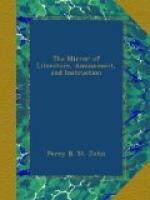The effect of a too close application of mind to study on the bodily health has long been a matter of common observation. The Roman orator, Cicero, points out forcibly the dangers arising from inordinate exertion of mind; and he has laid down some rules for guarding against the effects of study. M. Van Swieten, in alluding to this subject, relates the case of a man whose health was severely injured, by what he calls “literary watchings.” Whenever he listened with any attention to any story, or trifling tale, he was seized with giddiness; he was in violent agonies whenever he wanted to recollect any thing which had slipped his memory; he oftentimes fainted away gradually, and experienced a disagreeable sensation of lassitude. Rousseau has very justly remarked, that excessive application of mind “makes men tender, weakens their constitutions, and when once the body has lost its powers, those of the soul are not easily preserved. Application wears out the machine, exhausts the spirits, destroys the strength, enervates the mind, makes us pusillanimous, unable either to bear fatigue, or to keep our passions under."[3]
Shakspeare appears to have formed a just conception of the great injury which the corporeal frame experiences from a too close application of mind. The immortal bard observes,—
“——Universal plodding poisons up The nimble spirits in the arteries As motion and long-during action tires The sinewy vigour of the traveller.”
Love’s Labour Lost.




